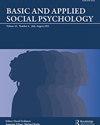矛盾性别歧视量表(EASI)的经验
IF 1.8
3区 心理学
Q2 PSYCHOLOGY, SOCIAL
引用次数: 13
摘要
我们开发并验证了一个自我报告量表,评估女性在家长制、性别分化和异性恋等领域的敌意和善意性别歧视的日常经历。在两个独立的样本中(n = 540和345),女性报告了她们经历来自矛盾性别歧视理论的各种敌意和善意形式的基于性别的对待的频率。探索性和验证性因素分析,以及项目反应理论,产生了一个28个项目的量表(矛盾性别歧视体验量表[EASI]),其中有五个子量表评估敌意性别歧视、异性恋敌意、保护性家长制、互补性别差异和异性恋亲密关系。与善意性别歧视自我报告量表相比,EASI具有良好的内部一致性、信度、收敛和发散效度、并发效度和增量效度。此外,它还可以灵活地用于衡量特定情境下的性别歧视经历。我们还验证了一个20项的简短版本(EASI-20)和一个非常简短的10项版本(EASI-10),以便在时间限制的情况下使用。讨论考虑了EASI为研究人员提供的好处,以及它的局限性。本文章由计算机程序翻译,如有差异,请以英文原文为准。
The Experiences with Ambivalent Sexism Inventory (EASI)
Abstract We developed and validated a self-report scale assessing women’s daily experiences with hostile and benevolent sexism within domains of paternalism, gender differentiation, and heterosexuality. Women in two independent samples (Ns = 540 and 345) reported how frequently they experienced various hostile and benevolent forms of gender-based treatment derived from ambivalent sexism theory. Exploratory and confirmatory factor analyses, along with item response theory, resulted in a 28-item scale (the Experiences with Ambivalent Sexism Inventory [EASI]) with five subscales assessing hostile sexism, heterosexual hostility, protective paternalism, complementary gender differentiation, and heterosexual intimacy. The EASI demonstrates good internal consistency reliability, convergent and divergent validity, concurrent validity, and incremental validity when compared with a self-report measure of benevolent sexism. Moreover, it can be used flexibly to measure sexism experiences within specific contexts. We also validated a 20-item short version (the EASI-20) and a very brief 10-item version (the EASI-10) for use in time-constrained contexts. Discussion considers the benefits that the EASI offers researchers, as well as its limitations.
求助全文
通过发布文献求助,成功后即可免费获取论文全文。
去求助
来源期刊

Basic and Applied Social Psychology
PSYCHOLOGY, SOCIAL-
CiteScore
4.50
自引率
12.50%
发文量
7
期刊介绍:
Basic and Applied Social Psychology (BASP) emphasizes the publication of outstanding research articles, but also considers literature reviews, criticism, and methodological or theoretical statements spanning the entire range of social psychological issues. The journal will publish basic work in areas of social psychology that can be applied to societal problems, as well as direct application of social psychology to such problems. The journal provides a venue for a broad range of specialty areas, including research on legal and political issues, environmental influences on behavior, organizations, aging, medical and health-related outcomes, sexuality, education and learning, the effects of mass media, gender issues, and population problems.
 求助内容:
求助内容: 应助结果提醒方式:
应助结果提醒方式:


